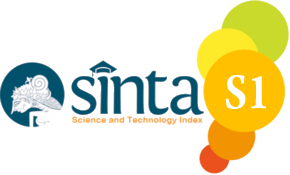METODE PENENTUAN AWAL WAKTU SALAT DALAM PERSPEKTIF ILMU FALAK
Abstract
Keywords
Full Text:
PDFReferences
Al-Banjary, Nur Hidayatullah. Penemu Ilmu Falak: Pandangan Kitab Suci dan Peradaban Dunia. Yogyakarta: Pustaka Ilmu, 2013.
Arikunto, Suharsimi. Prosedur Penelitian : Suatu Pendekatan Praktek. Jakarta : Rineka Cipta, 2006.
Azhari, Susiknan. Ilmu Falak Perjumpaan Khazanah Islam dan Sains Moderen. Yogyakarta: Suara Muhammadiyah, 2007.
______________. Ensiklopedi Hisab Rukyat. Yogyakarta: Pustaka Pelajar, 2008.
Danial. Seri Buku Daras Filsafat Ilmu. Yogyakarta: Kaukaba, 2014.
Hasan Bisri, Cik. Model Penelitian Fiqh, Paradiqma Penelitian Fiqh dan Fiqh Penelitian. Jakarta: Prenada Media, 2003.
Herdiwijaya, Dhani. Diskusi Pengamatan Kecemerlangan Langit. Imah Noong, Lembang 30 Agustus 2014.
Ibrahim, Abdullah. Peranan Ilmu Falak Dengan Ibadah. t. tp: t. p, 2011.
Izzuddin, Ahmad. Akurasi Metode-metode Penentuan Arah Kiblat. Jakarta: Kementerian Agama RI, 2012.
Jamil, A. . Ilmu Falak (teori & aplikasi). Jakarta: Amzah, 2009.
J. Moleong, Lexi. Metodelogi Penelitian Kualitatif. Bandung: Remaja Rosdakarya, 1995.
Karim, Abdul dan M. Rifa Jamaluddin Nasir. Mengenal Ilmu Falak: Teori dan Implimentasi. Yogyakarta: Qudsi Media, 2012.
Kementerian Agama RI. Ilmu Falak Praktik. Jakarta: Sub. Direktorat Pembina Syariah dan Hisab Rukyat Direktorat Urusan Agama Islam & Pembina Syariah, 2013.
Khazin, Muhyiddin. Ilmu Falak Dalam Teori dan Praktik. Yogyakarta: Buana Pustaka, t. th.
Musonnif, Ahmad. Ilmu Falak, Metode Hisab Awal Waktu Salat, Arah Kiblat, Hisab Urfi dan Hisab Hakiki Awal Bulan. Yogyakarta: Teras, 2011.
Nasution, S. Metode Research (Penelitian Ilmiah). Jakarta: Bumi Aksara, 2002.
Saksono, Tono. Mengungkap Rahasia Simponi Dzikir Jagat Raya. Bekasi: Pustaka Darul Ilmi, 2006.
Soejono dan Abdurrahman. Metode Penelitian; Suatu Pemikiran dan Penerapan. Jakarta: Rineka Cipta dan Bina Adiaksara, 2005.
Supriatna, Encup. Hisab Rukyat dan Aplikasinya. Bandung: Refika Aditama, 2007.
Tim Majelis Tarjih dan Tajdid PP Muhammadiyah. Pedoman Hisab Muhammadiyah. Yogyakarta: Majelis Tarjih dan Tajdid Muhammadiyah, 2009.
Tuddar Putri, Husna. Tesis: Pemikiran Syekh Abbas Kuta Karang Tentang Hisab Penentuan Awal Bulan Hijriah. Semarang: IAIN Walisongo, 2013.
Yusuf, Muchtar. Ilmu Hisab dan Rukyah. Banda Aceh: Al-Wasliyah University Press, 2010.
DOI: http://dx.doi.org/10.22373/jiif.v14i2.330
Refbacks
- There are currently no refbacks.
Welcome to Jurnal Ilmiah Islam Futura (JIIF) open journal system. Thank you very much for visiting. We are looking forward to getting your research articles
Jurnal Ilmiah Islam Futura
All works are licensed under CC-BY
©Published by Center for Research and Community Service (LP2M) in cooperation with the Postgraduate Program of UIN Ar-Raniry Banda Aceh, Aceh, Indonesia.





